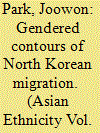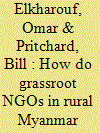| Srl | Item |
| 1 |
ID:
147864


|
|
|
|
|
| Summary/Abstract |
This article examines the gendered and sexualized contours of North Korean experiences in South Korea at a time when nearly 70% of the North Korean emigrants are women. South Korean television shows – e.g. reality programs – and marriage matchmaking organizations seek to portray North Korean women in a ‘positive’ way to the South Korean public, although, as this article will illustrate, these representations are of a very particular, sexualized kind. These representations are sometimes negative, and there is stigma attached to North Korean women, in which South Koreans assume, for example, that they are victims of human trafficking or that they have had relations with Chinese men during their migration. Furthermore, poor nutrition and other forms of structural violence in North Korea have molded North Korean bodies; there are often physical disparities between North and South Koreans. In South Korean society where short height is viewed as undesirable and where idealized, surgical notions of beauty dominate, the violence of gendered phenotypical normalization mark North Korean bodies as smaller, foreign, and strange. Based on ethnographic research in South Korea, this article argues that these gendered contours of North Korean migration amount to a different sort of structural violence in South Korea.
|
|
|
|
|
|
|
|
|
|
|
|
|
|
|
|
| 2 |
ID:
169146


|
|
|
|
|
| Summary/Abstract |
Recent research has promoted the idea that political struggles over food systems can be understood through the concepts of food security (the right to access food) and food sovereignty (the right to exercise control over food systems). These concepts emphasise different political priorities in the social relations of food: for the former, the promotion of decent work and the strengthening of the social safety net to enhance people's abilities to put food on their plates; for the latter, the defence of land, water and resource rights, to underpin capabilities for food own‐provisioning. The question we pose in this paper is how these priorities are articulated by grassroots non‐government organisations working at the frontline of global food poverty? Interviews with 22 representatives of food‐related non‐government organisations in Myanmar were used to elicit narratives about how they understood their challenges. The paper finds that narratives did not cohere exclusively to either the food security or food sovereignty concept, but blended ideas associated with the political priorities of both in complex and contradictory ways. These insights lend important firsthand evidence to the argument that supports a multi‐dimensional framing of the politics of food that is inclusive of the diverse struggles highlighted by food security and food sovereignty concepts.
|
|
|
|
|
|
|
|
|
|
|
|
|
|
|
|
| 3 |
ID:
178161


|
|
|
|
|
| Summary/Abstract |
In 1925 the Madras Municipal Corporation introduced an innovative scheme to provide free midday meals for poor schoolchildren in the city. These meals were designed to both improve the physical health of the schoolchildren and contribute to their educational attainments. This paper examines the advice of nutritional experts at the Coonoor Centre for Nutritional Research and the new scientific emphasis on diet and malnutrition in South India. It then considers the debates among the corporation’s elected councillors regarding the particular nutritional needs of the Indian schoolchild. These negotiations contributed to wider debates about nutrition and colonial science and reflected changing discourses surrounding the relationship between the state, experts and parents. Although the scheme was limited in funds and in scale, I suggest that the political commitment to feeding hungry children was a significant departure in the history of children and the Indian welfare state.
|
|
|
|
|
|
|
|
|
|
|
|
|
|
|
|